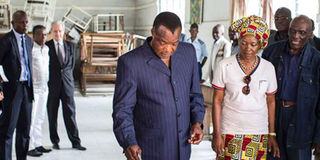Nguesso seeks to extend his rule under media blackout

Incumbent Congolese President Denis Sassou Nguesso casts his ballot at a polling station in Brazzaville on March 20, 2016. Congo began voting on March 20 under a media blackout, in a tense ballot expected to see President Denis Sassou Nguesso prolong his 32-year rule over the oil-rich but poor nation. PHOTO | AFP PHOTO
What you need to know:
- On the eve of voting, Interior Minister Raymond Mboulou ordered a 48-hour communications blackout, instructing telecoms firms to block all telephone, Internet and SMS services for “reasons of security and national safety”.
- Sassou Nguesso himself voted in central Brazzaville late morning.
- In the northern Ouenze neighbourhood, where support for the president is high, locals said they wanted “stability,” and “peace,” two watchwords of Sassou Nguesso’s re-election campaign.
BRAZZAVILLE, Sunday
Congo voted Sunday under a nationwide media blackout, in a tense ballot expected to see President Denis Sassou Nguesso prolong his 32-year rule over the oil-rich but impoverished nation.
On the eve of voting, Interior Minister Raymond Mboulou ordered a 48-hour communications blackout, instructing telecoms firms to block all telephone, Internet and SMS services for “reasons of security and national safety”.
Polls had been due to open at 7:00am (0600 GMT), but in most polling stations visited by AFP they opened an hour late. By the middle of the day voting was going smoothly. The polls will close at 6:00pm (1700 GMT). “There were some delays but it is improving. Things are going calmly,” said Eric Katolo, head of an 18-person observer mission from the International Conference on the Great Lakes Region (ICGLR).
Sassou Nguesso himself voted in central Brazzaville late morning.
In Poto-Poto, in the city centre, dozens of youths took advantage of a traffic ban to play football in the street. There was a visible police presence, notably at checkpoints monitoring vehicles allowed on the road, but nothing overwhelming.
In the run-down Makelekele district in the south of the capital, few hid opposition to the incumbent president. “He won’t get 10 votes here,” said Raymond, a 56-year-old builder.
In the northern Ouenze neighbourhood, where support for the president is high, locals said they wanted “stability,” and “peace,” two watchwords of Sassou Nguesso’s re-election campaign.
TELECOMMUNICATIONS BANNED
With all telecommunications banned, it was impossible to obtain information on what was going on outside the capital.
A government source told AFP the shutdown was intended to stop any “illegal” publication of the results.
Tensions have been running high in Congo since an October referendum when voters agreed changes to the constitution that removed a two-term limit, allowing 72-year-old former paratrooper colonel Sassou Nguesso to run in the election.
The vote also removed a 70-year age limit for the presidency that could have forced one of Africa’s five longest-serving leaders to step down.
The changes were approved in a referendum by 94.3 percent, dubbed “a constitutional coup” by the opposition. Even before the vote, protests erupted which left several people dead.
Sassou Nguesso has said he has no doubt he will beat his eight rivals, describing election day as a “penalty kick and then victory”.
On Friday, five rival presidential contenders — including former military chief Jean-Marie Mokoko — signed an agreement to back the strongest candidate among them in the event of a second round vote.
While the Republic of Congo saw “robust growth” of five percent over five years through to 2014, with oil and timber providing its main revenues, the country remains in dire straits.
Unemployment hit 34 percent in 2013, the last data available, and stood at 60 percent for 15- to 24-year-olds. The IMF fears “domestic instability” without progress in the battle to eliminate poverty.





